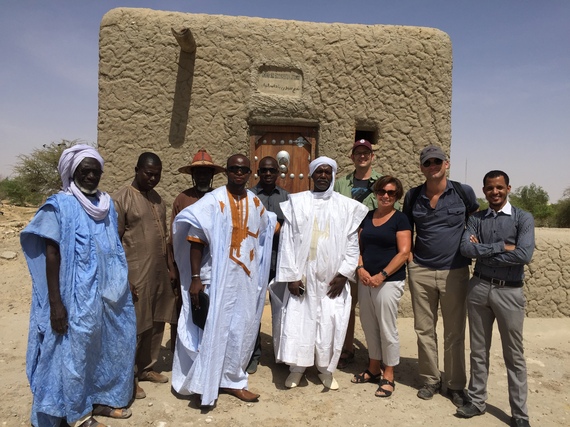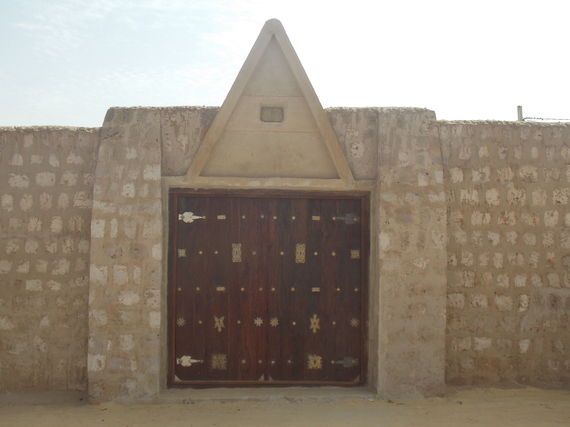Co-authored by El Hadj Djitteye, a blogger, journalist, and international NGO representative, based in Timbuktu, http://timbuktu-lopac.tumblr.com/On September 27th when the International Criminal Court in The Hague handed down a sentence of nine years in prison for Ahmad al Faqi al Mahdi for the war crime of destroying cultural heritage in Timbuktu, civic and religious leaders in the famed city of 333 saints were relieved that justice -- for once -- had been done.
While for the international community the trial has set an important precedent for punishing cultural heritage destruction as a war crime, for people in Timbuktu, it marks one step in their recovery from the trauma of 2012-13, when the town was subjected to the brutal rule of occupying extremists (a toxic mix of al-Qaeda linked jihadists and Tuareg separatists). They committed grave human rights abuses, desecrated monuments and artifacts, and even banned music- the lifeblood of Timbuktu, and Mali. Fear of reprisals from extremists still lingering in the desert environs prevented some from speaking with the authors, who conducted interviews in Timbuktu about the trial. Others too busy with eking out a living in a still dangerous Timbuktu bereft of tourism, a key source of income, knew nothing of the trial in The Hague.
The memories of the occupiers attacking Timbuktu's shrines and mosques are still fresh for Salem Oud El Hadj, Timbuktu's greatest living historian.
"I couldn't believe it when I saw on the television the destruction of the shrines of the saints of Timbuktu. I was traumatized, upset beyond words at these cataclysmic acts that were an enormous sin against God, against Islam, and against the history of Timbuktu."
Modest buildings architecturally, the shrines have tremendous significance as the tombs of the city's scholar/saints. (That the line is blurred between scholars and saints gives an idea of how much the people of Timbuktu value knowledge.)
 Photo of the authors and others (including local stonemasons) in front of a restored shrine in Timbuktu, courtesy of Cynthia Schneider
Photo of the authors and others (including local stonemasons) in front of a restored shrine in Timbuktu, courtesy of Cynthia Schneider
The mausoleums represent symbols of his cultural patrimony for Manny Ansar, Co-Director of the Timbuktu Renaissance (Malian-American project to support Timbuktu's and Mali's recovery from conflict through a focus on culture), and founding Director of the renowned Festival Au Désert, that attracted fans and musicians from around the world to Timbuktu to listen to and jam with Mali's music greats.. They remind Ansar of his family's and Timbuktu's nomadic past, when Bedouins would mark the graves of important figures with large stones so that worshippers could find the spot amidst the shifting sands of the desert.
Attacking the shrines, according to Abdrahamane Ben Essayouty, Grand Imam of the Djingareyber mosque, was like attacking the foundation of Timbuktu's identity. For Abdoulaye Touré, Regional Coordinator of the Association of Victims of Timbuktu, the town became like a city of the dead after the monuments were desecrated. When they were rebuilt by local stonemasons--- through a campaign organized by Irina Bokova, Director General of UNESCO -- Timbuktu started to come alive again.
"With the reconstruction of the mosques and the tombs, we rediscovered our sense of pride and joy", declared the imam of Djingareyber.
Al Faqi al Madi's trial in The Hague and the UNESCO-organized rebuilding of the shrines and mosques provide concrete proof that the world values Timbuktu's cultural heritage.
In addition, and importantly in a region (northern Mali) where justice is not a reliable commodity, the perpetrator of a crime has not escaped with impunity. Diadie Hammadoune Maiga, who served as the President of the Committee on Crisis and interceded on behalf of the people of Timbuktu with the occupiers, emphasized the importance to the morale of the still recovering town that al Faqi al Mahdi is being punished.
"For once, justice has been done. We (the people of Timbuktu) are happy that those who thought they were all powerful (occupying extremists) will see that they cannot wound peoples' souls, spirits, and possessions without suffering the consequences."
Leaders in Timbuktu contrasted the international community's action in capturing and trying al Faqi al Mahdi with the Malian government's lack of initiative in punishing wrongdoers from the occupation.
"The biggest problem (in Mali, especially northern Mali) is the lack of justice, which leads to crimes committed with impunity, which, in turn leads to violence and anarchy," noted Maiga.
The importance of the trial for Maiga extends beyond punishing the individual acts of al Faqi al Mahdi to the long term task of rebuilding a sense of security and trust among the citizens of Timbuktu. Timbuktuans, many of whom are destitute without the tourism on which so much of the town's economy depended, can feel powerless against the global forces that brought conflict to their doorstep. And they have seen international delegations come and go without ever delivering on their promises. But the ICC trial and the reconstruction of the destroyed monuments show that - at least sometimes - they can depend on the international community.
Now Salem Oud El Hadj thanks God that he has lived to see the perpetrator of the crimes against Timbuktu's history and heritage punished.
The imam of the Djingareyber Mosque had a slightly different response. A living example of the tolerance for which Timbuktu historically has been known, and which was so dramatically violated during the occupation, the imam is prepared to pardon Ahmad al Faki al Mahdi since he has confessed his guilt and apologized for his acts. (Others wondered if al-Faqi al Mahdi's confession was not prompted more by expediency than sincerity.)
Satisfaction that a desecrator of Timbuktu's cultural heritage has been punished is tempered by an undercurrent of dissatisfaction that nothing has been been done about the violations of human rights during the occupation. People who suffered beating and torture wonder why their tormentors have gone free. One Malian government official, speaking on condition of anonymity, remarked acerbically that the Court only goes after small fish, not the powerful extremists who brutally subjugated the people of Timbuktu.
But while Timbuktu awaits justice for the human rights violations committed during the occupation, the trial of al Faqi al Mahdi sends a clear message to would- be jihadists who still terrorize government officials and MINUSMA troops: no impunity for destroying cultural heritage. Bringing this former son of Timbuktu to justice marks one step on the long path to reconciliation, peace, and, eventually prosperity for the fabled city, once renowned as a center of knowledge, commerce, tolerance, and plurality.
